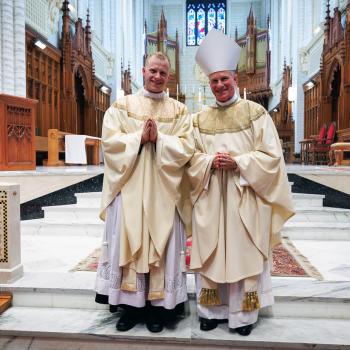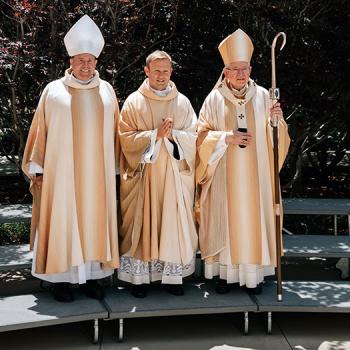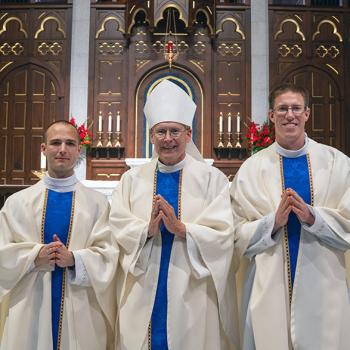
In my previous post, I addressed five common objections against women preachers and teachers for you to consider. Here are answers to 5 more frequent protests against women speaking in the church.
1. “A pastor must be the husband of one wife and therefore, only men qualify, since a woman can’t be the husband of a wife.”
“This is a faithful saying: If a man desires the position of a bishop, he desires a good work. A bishop then must be blameless, the husband of one wife, temperate, sober-minded, of good behavior, hospitable, able to teach; (1 Tim. 3:1-2 NKJV)
There are several things to note here.
First, in several translations, 1 Timothy 3:1 is translated as “if a man desires…” and many use this to argue against women preachers, stating it explicitly says “man.” However, the word that’s used in the Greek text is the pronoun τις which generally means “anyone” or “someone” and can refer to either a male or female. So off the top, it seems to me as if someone had an agenda.
Second, Gotquestions.org states: “First Timothy 3:2 specifically says that the overseer is to be ‘faithful to his wife.’ This assumes he is a man.”
Well, if that’s the case, then it also assumes that he is a married man. In appealing again to common sense, if this verse excludes a woman from being an overseer because she’s not a husband and doesn’t have a wife, then that means, as many have often pointed out, that it also excludes Paul and other males who aren’t married and also males who don’t have any children from holding this office (1 Tim. 3:4).
If this reasoning can be applied to one gender then it should also be true for the other. Otherwise, one no longer holds a reasonable view or position, but is simply prejudiced against women.
Third, a pastor is not the same thing as an overseer. Many believe they are because of Acts 20:28, where Paul, speaking to the elders (plural) at the church at Ephesus says,
“Keep watch over yourselves and all the flock of which the Holy Spirit has made you overseers. Be shepherds of the church of God, which he bought with his own blood.“
This translation from the NIV and several other translations, translate the Greek verb poimainein as “be shepherds” of the church of God. However, the word poimaino here, is in the infinitive form. Therefore, it actually says “to shepherd” the church of God.
In other words, the elders, made as watchmen by the Holy Spirit, are “to tend” to God’s people, by caring for them and watching over them, faithfully and attentively, as would a shepherd. This doesn’t make them shepherds anymore than “doctoring” on someone makes me a doctor. But their job involves some aspect of shepherding or “caring” for the sheep.
Furthermore, 1 Peter 2:25 describes Jesus Christ himself as the “Shepherd and Overseer of your souls.” Now, was it necessary to use two different words to describe the same role? Or did Peter want them to understand that Christ is both the ultimate caretaker and protector of their souls?
To add, the verb poimaino can also mean “govern, guide, care for, or herd,” and metaphorically, it can also mean “to cherish.” All these are alternate translations that may be suitable and even better in this context. The same holds true for 1 Peter 5:4, which states:
“So I exhort the elders among you, as a fellow elder and a witness of the sufferings of Christ, as well as a partaker in the glory that is going to be revealed: shepherd the flock of God that is among you, exercising oversight, not under compulsion, but willingly, as God would have you; not for shameful gain, but eagerly; not domineering over those in your charge, but being examples to the flock. And when the chief Shepherd appears, you will receive the unfading crown of glory.” (1 Ptr. 5:1-4 ESV)
So, then, they were to care for the flock, specifically by exercising oversight rather than by performing general pastoral duties such as feeding, cleaning, and tending to the sick and wounded, physically and/or figuratively.
But, people will say a pastor and overseer are the same, because at some point, someone made that determination based on these verses, and everyone went along with it instead of thinking through it themselves.
Alone, these two passages do not conclude that a shepherd is the same role as an overseer, and I’ve encountered no better argument that suggests they are.
Likewise, an overseer is not the same as an elder (older, generally wise man). Another crucial point to consider regarding Acts 20:28, is that it tells us something specific. It tells us that the elders in Ephesus served as overseers within their congregation.
However, what it doesn’t say or imply, is that all elders everywhere are automatically overseers, nor does it prevent overseers from being individuals other than elders. This just happened to be the case in Ephesus, and perhaps it was for a reason.
In addition, Peter also urged the elders of certain provinces to “watch over” the flock, most likely referring to overseeing. Yet, this still doesn’t support the claim that all elders are also overseers.
Suppose some retirees in Washington and Florida work as Walmart Greeters. Then are all retirees in the United States Walmart Greeters? Why then do all elders in the church have to be overseers? As far as I know, the Bible doesn’t confirm either way, but rather we’ve made a pattern out of basic information we’ve collected.
It is not “three different words to describe the same role.” There are distinct meanings and characteristics associated with each word. The common assumption that the terms “elder,” “overseer,” and “pastor” are synonymous and interchangeable, reflects a hasty and oversimplified understanding of both the words and the passages.
So, what is an overseer?
The Greek word episkopos (επισκοπός) has been translated in English Bibles as either “bishop” or “overseer.” Therefore, in Scripture, the words “bishop” and “overseer” can be used interchangeably.
From its use in Greek mythology, ancient Greek government, and also in the Septuagint, an episkopos can be best understood as a “protector of a covenant,” or one with authority, who ensures things go according to the way they’re supposed to. As their primary function, they “watch-over” or “guard,” while pastors provide direct care. It might be best to describe the differences between the two using an example.
In the context of a church, a pastor would correspond to a shepherd caring for the flock. An overseer, however, is more comparable to what is known as a livestock guardian dog, or “LGD.” A livestock guardian dog (LGD) dwells within the flock, safeguarding it from predators. This is probably why Peter instructs: “tend to the flock of God that is among you.” (please note: “among you” not a “under you”)
It is the joint responsibility of shepherds and LGDs, to tend to the herd, though both have very different roles. While the dogs aren’t considered shepherds, they care for the flock by looking out for the sheep. And although the shepherd may defend the sheep, as David did in an immediate attack (1 Sam. 17:34-37), they can’t be on the lookout for danger 24-7 as LGDs can. There are many other tasks they need to accomplish.
Therefore, an LGD must be trustworthy, not running off and abandoning the flock at the sight of a “bone,” (a bribe or selfish-gain) or acting aggressively or harmful toward the sheep (Ex. 18:21; 1 Ptr. 5:2-3; 1 Tim. 3:3). To perform their important work, they undergo intense training before they’re stationed alone in the field. This concept of episkopos is depicted in Scripture.
“I know that after I leave, savage wolves will come in among you and will not spare the flock. Even from your own number men will arise and distort the truth in order to draw away disciples after them. So be on your guard! Remember that for three years I never stopped warning each of you night and day with tears.” (Acts 20:29-31)
I’ve written more about episkopos here, which may help you better understand the rest of my point. But the Apostle Paul would have been considered an episkopos, or “overseer,” among his many other roles.
Similar to an episkopos in ancient Greek government, Paul traveled not only to establish churches, but he regularly visited them and wrote authoritative letters to them to ensure they were staying on the correct path. This was the purpose of his letter to Timothy.
“Although I hope to come to you soon, I am writing you these instructions so that, if I am delayed, you will know how people ought to conduct themselves in God’s household, which is the church of the living God, the pillar and foundation of the truth.” (1 Tim. 3:14-15)
Paul was not appointed an apostle or overseer by men, but he was given special authority by the King to set up these various churches and help them walk in the ways of the King (Gal. 1:1). He was a chief watcher among the church, who instructed the elders at Ephesus, who were also watchmen among their congregation.
So, you see, 1 Timothy 3:2 is about overseeing. It’s not about preaching, teaching, or being a pastor.
This argument, then—that women can’t preach because they can’t be pastors because they can’t be husbands to a wife—is irrelevant to the discussion about women preachers and teachers, first, because a pastor is not synonymous with an overseer, and also because again, a pastor is different from a preacher.
One can be a pastor who preaches or a preacher who doesn’t pastor, and both roles are distinct from that of a watchman or overseer. Therefore, since this passage does not apply, this argument cannot be used to disqualify women from proclaiming the Lord.
2. “There aren’t any women named as pastors in the Bible.”
Actually, there are, in fact, women pastors in the Bible, such as Rachel (Gen. 29:9). However, it is correct that no women are explicitly mentioned as pastors in the New Testament in the figurative sense—but, neither are men.
I heard a message from John Piper arguing that women shouldn’t be given the title “pastor” because in our modern day thinking, people think of a pastor as a leader of the church. In other words, what he seemed to be saying was to disregard what Scripture teaches and what the biblical texts mean to instead cater to the modern understanding of people, basically admitting that a “pastor” today is a man-made position.
Well, I propose a different solution. Stop calling yourselves pastors in the first place, as if it’s some prestigious office. A pastor is not an “office” nor a special title that indicates authority or high rank. A pastor is simply a word used to describe the type of work you do, or should be doing daily.
What do I mean by this? A farmer does the work of a farmer, a nurse does the work of a nurse, and a sanitation worker does the work of a sanitation worker. All these individuals serve others but hold no special rank or office—they just do their jobs, and their titles describe the work that they do.
Likewise, the same as a literal shepherd, a pastor in a church needs no special office or rank—just do the work of a pastor, and shepherd or “tend to” God’s flock, serving each individual sheep as would a noble shepherd. Be a godly example and lead with the knowledge of God.
You could be a pastor without everyone knowing your name. Why do you seek recognition? Scripture teaches:
“For by the grace given me I say to every one of you: Do not think of yourself more highly than you ought, but rather think of yourself with sober judgment, in accordance with the faith God has distributed to each of you. For just as each of us has one body with many members, and these members do not all have the same function, so in Christ we, though many, form one body, and each member belongs to all the others.
We have different gifts, according to the grace given to each of us. If your gift is prophesying, then prophesy in accordance with your faith; if it is serving, then serve; if it is teaching, then teach; if it is to encourage, then give encouragement; if it is giving, then give generously; if it is to lead, do it diligently; if it is to show mercy, do it cheerfully.” (Rom. 12:3-8)
No one is more important than another in the body of Christ. The only head of the church is Jesus, and you and I both belong to one body. We belong to one another. So how can one have power over the other, including a man having influence over a woman who isn’t his wife?
Do your hands instruct your feet? Does your mouth control your gaze? Isn’t it your head that commands the coordination of all body parts to work together seamlessly, with each part following the lead of another as directed by the brain?
We function together in our distinct callings, whatever the Holy Spirit has placed us in the body to be, to make the whole body of Christ work in unison —the true meaning of “different, but equal.”
These callings aren’t special offices or positions of authority—-they’re who we are. If we were to set aside the pride of man and cease with these different “offices” that the Bible never mentions nor encourages, then I gather this argument about women being pastors or preaching wouldn’t exist to begin with.
The bottom line is that this argument has nothing to do with a woman preaching or teaching, and is therefore dismissed.
3. “No books of the Bible were written by women.”
This is one I’ve heard several times from John MacArthur and G3 ministries. For some reason, he and others seem to think that because none of the 66 books chosen by human beings to become a part of our Holy Bible were written by women, then that somehow serves as evidence that women aren’t supposed to speak or be leaders.
MacArthur says it’s a “pretty compulsive case for male leadership”—yet he doesn’t proceed to make the case on any occasion on which he makes the statement, and neither does anyone else. Therefore, there is no case here. Absolutely none.
I’m hesitant to even call it a claim, as it’s nothing more than an empty, unverified statement thrown out as a reason, apparently with the hopes that the hearers are stupid, blind, or ignorant. It’s based on nothing more than one’s opinion and understanding, and it’s amazing to me that so many people actually go along with this stuff.
It sounds like something a third-grader would throw out in an argument when they had nothing better to say: “Well! No books of the Bible were written by women! So there!” But, isn’t it time we stopped going along with everything someone says and began demanding them to make it make sense?
First, it would make sense to start with a little history and background information. During the New Testament era, it’s obvious that women didn’t have every privilege men had during those times, and so, perhaps women didn’t write as much as men.
Even if that wasn’t the case, given the culture and the inferior status given to women both then, and throughout history, why would anyone think that those mere human beings who compiled the books of the Bible, didn’t intentionally overlook writings by women, for the same reason women weren’t allowed to have a say in legal matters or hold public offices? Because women didn’t have a “voice”?
“Hey, look guys. This one fits all the criteria—oh, but wait, a woman wrote it. So, nevermind.”
We might want to think that since they were “church folk” that they would act with integrity, but regrettably, I have my doubts about this. I used to think that the compilation of the Bible was a divine act of God, but ultimately, it was just people putting writings together and then calling them “canonical.”
We are imperfect beings—dust particles, merely drifting through life, tossed to and fro, making many stumbles throughout our journey. There’s a good chance that we don’t get everything right all the time.
And there is nothing to suggest that the assembly of texts to create our Bible was a divine arrangement by God, and so it’s possible that there are other divinely inspired writings, potentially authored by women.
Second, since none of us was there looking over anyone’s shoulder as they wrote, we don’t know for sure who wrote any book of the Bible—especially where no name is mentioned as the author of a particular work. We just go by the assumptions of historians and biblical scholars and have faith that God will reveal his truth to us nonetheless.
So, in reality, one of these books or letters in the Bible could have in fact, been written by a woman, as some suggest. Unless you have any definite proof to state otherwise, that will always be a possibility.
Ultimately, what does the statement that a woman never wrote any book of the Bible have to do with proclaiming or teaching God’s Word? What does it have to do with anything at all? Absolutely nothing. This is again an opinion and not a good one. It doesn’t come from Scripture, nor can the reasoning behind it be supported by Scripture, and is therefore irrelevant.
4. Women in leadership roles were a sign of God’s judgment.
According to some, women shouldn’t preach because they shouldn’t lead men. Consequently, they reference passages such as Isaiah 3:12 to explain why Deborah, a woman, became a judge and a leader of the nation.
“My people — children oppress them, and women are ruling over them. My people! Your guides lead you astray and obliterate the paths you should follow.” (CJB)
Many have claimed that this verse clearly demonstrates that all women are unfit to lead and that men must be in charge. Somehow, they interpret this verse to mean Deborah, a woman appointed by God to relieve the people’s oppression, served as a judge over the nation, so as to punish it—-apparently, by making the men feel bad. What other judgment could they have received since God had given them the victory?
But is this the message being conveyed or is this interpretation another product of one’s imagination? Let’s analyze briefly.
First, we should determine what the word rule means in this verse. The Greek word in the Septuagint means “to lord over,” “be master of,” or “exercise control over.” In the Hebrew Bible, the word translated as rule means “reign” or “to have dominion.” The context implies that this ruling is done in a negative manner and is unapproved by God, and probably a type of ruling such as the oppressive rule of Rehoboam, or the tyranny of Athaliah.
So these women were ruling over the people in a negative manner. Who were these women? The books of Judges, Kings, and Chronicles do a good job of giving a thorough record of all the leaders in both Ephraim and Judah. So, who were these unnamed women who were supposedly in charge of the people? Why were they not mentioned as Deborah was?
Were they also judges? Were they queens? How else could they have ruled? Also, if there were unnamed women in these positions, then this means there were other women who led men back then? Right? That would open up a whole new can of worms.
And don’t say it’s talking about Deborah, because it says “women” and not “a woman.” So, how does one explain these questions that come along with this interpretation?
On the other hand, multiple commentators suggest that the verse is not to be taken literally, but is spoken metaphorically to describe the weakness of the nation. This would make sense since it can’t be saying that it’s bad for youth in general to rule, hence Solomon, who was chosen and loved by God, became king around the age of twenty, nor can it be referring to women in general being unfit to lead as again, Deborah was appointed by God to help carry out his plan of deliverance.
Neither of these were wicked or unfit to rule, and the Lord was with both of them (Jdgs. 2:18; 2 Chron. 1:1). There was nothing that implied that their leadership was related to any punishment or judgment, and those who use this as an argument can never provide evidence of such.
Even if the verse isn’t speaking metaphorically, it’s clear that many women among them in that particular day were indeed unfit to rule. However, this would have been due to their character, not their gender (Is. 3:16-17).
As others have already suggested, it could also refer to women in the background, who in a sense “rule” over the people by basically using the male kings as puppets. An example of this would be Jezebel the wife of Ahab, who persuaded her husband to do evil in God’s sight, leading the people astray.
In a different sense, it could be possible that a mother of a king saw her desires carried out through her son. As an example, Bathsheba went to Solomon on behalf of Adonijah to ask him to allow Abishag to be Adonijah’s wife.
Initially, Solomon was willing to give his mother whatever she requested (1 Kgs. 2:17; 20). However, being full of wisdom, he understood Adonijah’s underlying purpose so he didn’t let it happen. But, still, we can see how a king’s mother could have had great influence on how he handled the people, either in a positive or negative manner.
Now, let’s look at the Septuagint. The Septuagint renders this verse differently, yet still could be considered an accurate translation. A translation by the NET bible reads:
“Oppressors treat my people cruelly; creditors rule over them. My people, your leaders mislead you; they give you confusing directions.”
When there’s a discrepancy, consider what the rest of Scripture has to say. Scripture never says nor implies that it is an act of God’s judgment upon a nation, or that there is anything bad at all for youth or women to rule.
Yet, many argue that Deborah was chosen as a judge, because there were no male leaders willing to “step up,” and therefore, God had to reach down in the bottom of the barrel, to pull out a woman, and appoint her as a leader. Her appointment, somehow, was God’s judgment against the men of the nation for being weak and cowardly.
But, again, when pressed for biblical evidence to support this view, responses typically range from “crickets” to off-topic answers to good ole’ personal attacks, but no satisfactory proof is provided. In other words, it’s like reading a health article that claims, “Studies have shown…”, but fails to cite or direct you to the actual study.
Let’s get serious for a moment. John warned a group of Pharisees and Sadducees not to become too “puffed-up” and complacent about their connection to Abraham, as God could easily raise up children for Abraham from stones (Matt. 3:9). Do you genuinely believe that if God wanted a suitable male judge in place of Deborah, that he couldn’t have raised one up? Remember Gideon (Judges 6-8).
Do you not know the God you serve? Do you not have trust in his power and ability? Where is your faith if you believe he’s limited to what you might call “rations?” It’s like nails on a chalkboard whenever I hear someone make a statement such as, “There were no suitable men, so God had to use a woman.”
God never has to do anything.
Overall, this argument is shallow and poorly thought out. Furthermore, it makes no sense to base an argument against women leading on this verse, not only because its translation and interpretation are contested, but also because it contradicts other parts of Scripture that are clear.
In the end, this argument doesn’t work for either side, since again, ruling over others has nothing to do with preaching or teaching.
5. “Because the Bible says they can’t.”
An old video of Voddie Baucham is circulating on social media, where a man steps in to ask a question on behalf of his wife. He explained that his wife couldn’t ask the question herself, probably due to the belief that women aren’t permitted to speak or inquire during assemblies, as according to some, it would be seen as disgraceful.
He said his wife wanted to know why women weren’t allowed to preach in the church and if a woman feels she has the gift of preaching, why isn’t she allowed to preach?
A few chuckles disrupt the silence as Bauchman eagerly searches for 1 Timothy 2:12. He then reads it aloud confidently. Upon finishing, he looks up, and states in an authoritative manner, “Because the Bible says so.”
However, this is an unacceptable response. It’s a lazy and unconvincing one, used when one lacks a real answer, but depends on the belief that no one will challenge the Bible. Unfortunately, they’re often right as many feel ashamed or rebellious for inquiring further.
The difficulty of asking more questions is further compounded, when audiences ignorantly hoot and applaud at these answers, as if they’d just heard something profound. Any person seeking the truth may feel discouraged and belittled by this insensitive behavior.
To start, there are multiple known issues with 1 Timothy 2:12— not related to the verse itself, but concerning our translations and interpretations of it. But, I’ll get into that much later.
Also, upon reading the Bible, it’s not difficult to observe that when God, Jesus, Paul, or others issue commandments or authoritative directives, there is usually a reason or explanation that accompanies them (Gen. 3:17; 7:1; 19:13; 20:3; 21:12; Exodus 12:17; 17:14; 21:18; 22:26-27; 23:9;. 23:33; 29:33-34; 31:14; Lev. 5:11; 10:7; 10”13; 11:13; Deut. 7:7-8; Isaiah 1; Matt. 1:21; 5:12; Mark 13:35; Jn. 13:34; Rom. 13:5).
This is because God is our Heavenly Father, not a spiritual dictator. Just as any parent does, he wants us to understand the reasoning behind his rules, which are meant for our benefit. Personally, knowing the “why” behind something, rather than blindly following a command, makes me more inclined to obey the rule consistently.
In knowing the reason, I have an opportunity to agree, and understand, why a prescribed course of action may be more beneficial, than one based on my own understanding. As a result, I will more likely follow it in the future.
But it’s troubling that those who discourage others from preaching and teaching, are unable to properly teach the Word themselves. It’s nothing personal against Bauchman as he’s not the only one using this empty response; other high-profile, knowledgeable preachers and teachers have also done so. But it is unacceptable to those who seek truth and seek to understand the will of our Lord.
These are some answers to 5 common arguments against women preachers. Even if you disagree with my explanations, I urge you to carefully consider the specific doctrines you adhere to and the reasons behind embracing them as divine truth.
Have you accepted them merely because your favorite preacher endorsed them, or have you dug into the scriptures, earnestly prayed for insight, and pondered them yourself?
Make no mistake. My aim is not to win arguments, but to highlight the fallibility of our knowledge and the folly of establishing regulations based on flawed perceptions. The truth is, we don’t know everything we think we know.
Acknowledging this truth humbly allows for further contemplation, prayer, and devotion to learning, fostering deeper understanding, faithfulness, and obedience to the Lord, which undoubtedly pleases him.


















